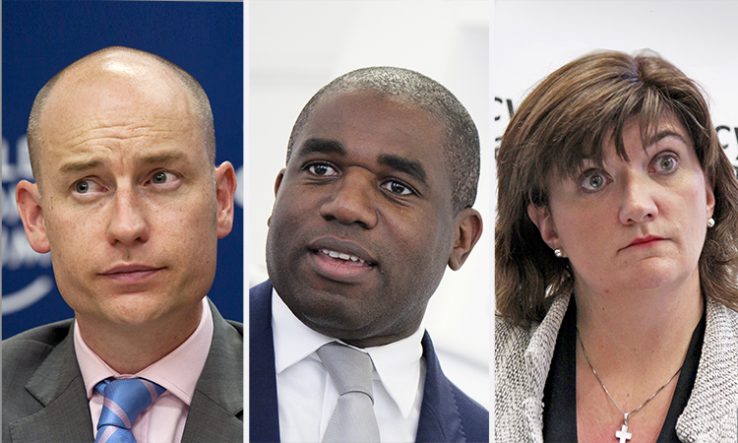
Images: World Economic Forum [CC BY-SA 2.0], via Wikimedia Commons; Policy Exchange [CC BY 2.0], via Flickr
Three former MPs were paid for appearing at events
A former education secretary and an ex-higher education minister are among the politicians who have accepted payments from universities for speaking at their events in the last two years.
An investigation by Research Professional News has found that three parliamentarians, all of whom were MPs at the time of their speeches, accepted four-figure sums from universities—and in one case a students’ union—in exchange for their appearance. According to the parliamentary register of financial interests, which details income earned by MPs over and above their normal salary, they are the only three MPs receiving such payments from UK institutions.
The highest paid was David Lammy, Labour Party candidate for Tottenham who has been the North London constituency’s MP since 2000. Lammy, a former higher education minister, received £2,317.80 from Bournemouth University for an October 2018 speech, £2,295 from the University of the West of England (UWE) for a speech in March last year, and £1,640 for an appearance at Kent Union—the University of Kent’s students’ union—in March 2019.
Research Professional News has approached Lammy for a response.
A spokesman for the University of Bournemouth told us that Lammy had visited Bournemouth University as a part of Black History Month, where he spoke about his work on the Lammy review. Kent Union told us Lammy appeared on a panel at its Africa Summit, where he spoke about the African diaspora and Brexit. UWE has been approached for comment.
Meanwhile, Nicky Morgan, the secretary of state for digital, culture, media and sport and a former Conservative MP for Loughborough, received £2,125 from Edge Hill University for its “An Evening with Nicky Morgan” event in October 2018; and Labour election candidate for Aberavon Stephen Kinnock received £1,000 after taking part in a panel discussion at the University of Warwick in October this year.
Nicky Morgan has been approached for comment.
Kinnock told Research Professional News that since becoming an MP in 2015 he had “taken part in a number of student events and the panel at Warwick was the only event for which I have received any remuneration”.
“Warwick University offered the same honorarium to other speakers. I accepted Warwick’s offer because it involved me taking time out of my personal diary to attend the question time session and an evening dinner, which, as a result, required an overnight stay. Given the high attendance at the event I hope that the students found it to be a stimulating and productive discussion.”
Warwick said the payment to Kinnock, which came from its Department of Economics, was made available to all external speakers taking part in the Economics Question Time event.
In the cases of Lammy and Morgan, their university appearances were facilitated by agencies: The Speaking Office and Tidy Management respectively. Research Professional News has approached both companies for comment.

Jo Grady, general secretary of the University and College Union, told Research Professional News that it was the “marketisation of higher education [which] means that some universities like to compete to build the flashiest buildings or host the best soirées with the most important guests”.
“The fact that MPs are jumping on this gravy train just feels a bit grubby,” she said. “Should they be accepting money from the taxpayer or student fees to speak?”
However, Nick Hillman, director of the Higher Education Policy Institute, said: “I don’t think, on the face of it, that this seems too outrageous.”
“The MPs have declared it all and the universities weren’t in their own constituencies,” he added.
“However, I would worry if a precedent were to be set whereby every speaker at every university expected a fee. If that happened, the end result would be many fewer interesting events. I would also worry if MPs turned down university engagements just because no fee was on offer. We need policymakers to be regularly on campus if they are to understand our sector.”
This is the latest in our pre-election look at parliamentary candidates‘ financial relationships with universities. Last week, we revealed that Conservative candidate Andrea Jenkyns is being paid £25,000 by the University of Bolton for heading up a think-tank at the north west institution.